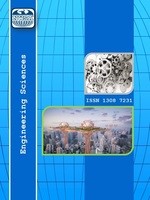KENDİLİĞİNDEN YERLEŞEN BETONDA BASINÇ DAYANIMI İLE ÇEKME DAYANIMI VE E-MODÜLÜ İLİŞKİLERİ
Bu çalışmada, Portland çimentosu (PÇ) yerine uçucu kül (UK) ve silis dumanı (SD) gibi farklı tip ve dozajda mineral katkı içeren kendiliğinden yerleşen beton (KYB) için basınç dayanımının hem çekme dayanımı hem de elastisite modülü ile ilişkileri araştırılmıştır. KYB karışımları için çökme-yayılma, T50cm, L-kutusu ve elek segregasyon işlenebilirlik deneyleri gerçekleştirilmiştir. Üretilen numuneler kalıptan alındıktan sonra, toplam 28 gün süreyle 20±20C suda kür edilmiştir. Her bir beton özelliği için 3 numune kullanılarak, basınç ve yarmada çekme dayanımı ve elastisite modülü deneyleri yapılmıştır. Bu deneylerden elde edilen çok sayıda veri kullanılarak yapılan regresyon analizi sonucu bulunan basınç-çekme dayanımı ve basınç dayanımı-elastisite modülü bağıntıları önceki çalışmalara ait bağıntılarla karşılaştırılmıştır. Sonuç olarak, bu çalışmadan elde edilen basınç-çekme dayanımı bağıntısının yüksek dayanıma sahip kendiliğinden yerleşen ve diğer betonların çekme dayanımını ve basınç dayanımı-elastisite modülü bağıntısının ise hem normal hem de yüksek dayanımlı kendiliğinden yerleşen ve diğer betonların da elastisite modülünü doğru tahmin etmede kullanılabileceği sonucuna varılmıştır.
RELATİONSHİPS OF COMPRESSİVE STRENGTH WİTH TENSİLE STRENGTH AND E-MODULUS İN SELF COMPACTİNG CONCRETE
In this study, relationships of compressive strength with tensile strength and elastic modulus was investigated for self-compacting concrete (SCC) containing different types and dosages of mineral admixtures (fly ash (FA) and silica fume (SF)). Slump-flow, T50cm, L-box and sieve segregation tests were achieved for SCC mixes. In the following day of casting, the specimens were de-moulded and located in standard 20±20C water cured for the period of 28 days. Compressive strength, splitting tensile strength and elastic modulus tests were performed using a total of 3 specimens for each concrete property. Compressive–tensile strength and compressive strength-elastic modulus formulas obtained from regression analysis using a numerous data were compared with the equations of previous studies. Consequently, it was found that compressive strength-elastic modulus formula obtained from this study has almost estimated the elastic modulus of both normal and high strength self-compacting and other concretes, whilst compressive–tensile strength formula has correctly estimated the tensile strength of high strength self-compacting and other concretes.
